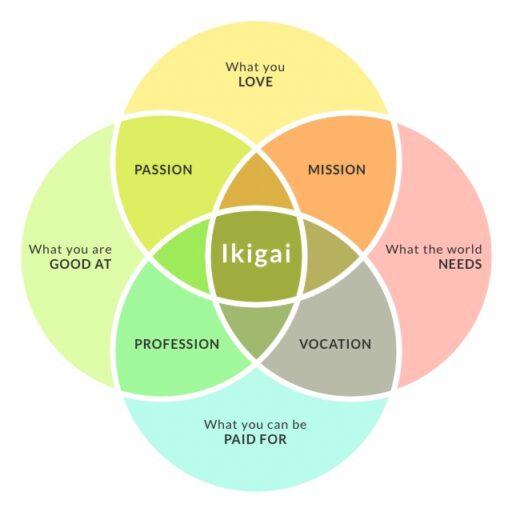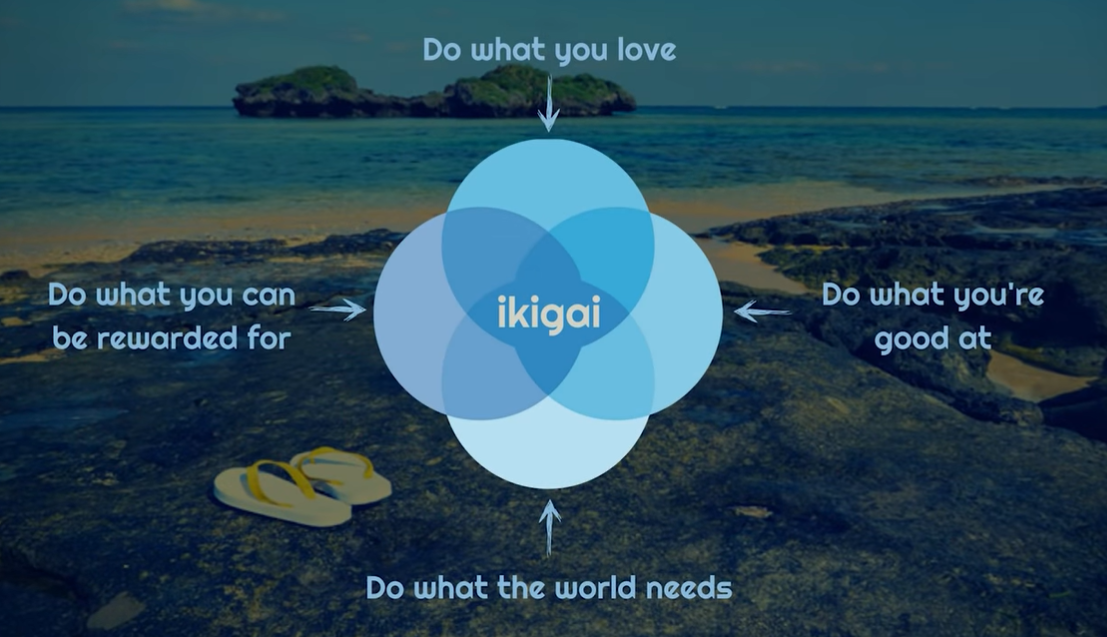Find your Ikigai and calling to life
Ikigai is a Japanese word that describes a deep reason to be alive. Finding activities in life that have this element of 'Ikigai' can give us a sense of meaning and inner purpose. Because the true story is that we all need a dream to pursue when we wake up each morning.

This article dives into a step by step approach to help you discover your Ikigai and how you can make a lasting and significant impact in the world.
The definition of Ikigai
“Ikigai is really like a treasure map. And, this treasure map can help you find your way to finding wonderful things about yourself that you can share with the world, and the world will say ‘thank you’ for it.”
- Tim Tamashiro
Ikigai is composed of two words, Iki and Kai. Iki refers to 'life', while Kai is roughly translated to 'the realization of what one expects and hopes for', or in short 'worth'. Living a life of Ikigai therefore means that you have something worthy to live for each day, while obtaining joy and happiness from it.
Origin of Ikigai
Ikigai has its origins from the Japanese community of Okinawa. It is the place where a significant amount of people are over 100 years old. Coincidentally, these Japanese people do not have a word for retirement, which implies that they do not view their late years of life as something to retire from. Many older people therefore never really retire, but keep doing what they love for as long as their health allows.
In other words, worthy and valuable work is implicit in their way of living and doesn't stop at age 65. Or said in a better way; they do not see a reason to retire from feeling joy, being alive and having a reason to live in the first place. Instead, they view Ikigai as the deep reason of meaning behind one's identity and life's goal - their source of flow in the moment.
Ikigai is a verb
Ikigai isn't something you look for and then you are done. It is a constant process of allowing the self’s possibilities to blossom.
"What makes ikigai so effective is its inextricable link to a sense of mastery. It emphasises process and immersion rather than a final aim"
- Iza Kavedžija
It is a mindset for life that you adopt to create a life worth living - while reinforcing it daily. It means to serve, to create, to delight, to provide, to
teach, to connect and to build - whatever and with whomever - for as long as it adds daily to the quality of your life and of others.
But how do we find activities that have Ikigai?
It really depends where you start.
Passion isn't enough
The normal approach to start with the exploration of our Ikigai by asking ourselves what we love. This is a natural pathway to take because most people base their feeling of happiness on it. The second question we ask ourselves is what we are good at. These two elements together form our passion.


One example of this is Steve Jobs. He was interested and passionate about Zen Buddhism before he started Apple, but he started selling electronics for quick cash. He focused on what the world needed and what he could be paid for.
So even though a passion can be great, don't blindly follow it. Instead, figure out where the world needs your help, then see where opportunities are found which click with your possible skill-set and personality. The updated Ikigai model shown below can be useful, because it starts with the step of what the world needs, automatically focusing on where you can have a high impact, while also looking at the skills you would need to develop.
Searching for a high impact Ikigai

Starting from this line of reasoning, you can make a list of possible contributions to the world that would increase the life quality form the whole planet, or a specific portion of people or animals.
The first step is to find a problem in the world and a natural gap to be solved. Then ask yourself which skills need to be cultivated along the way and if this is really something you could learn to love as the process. If you manage to go through these two steps, you are close to creating something that is of value to others, which in turn covers the aspect of money.
But let's be clear. Not being paid for something is okay too. As long as you think you think it can be valuable in the future. And besides money, you can also get paid in different forms than money, such as favours, connections, appreciation or valuable experiences and life lessons - because you never know up front what you will get in return for following your Ikigai.
Step 1. Doing what the world needs
Doing something that contributes is a hard place to start from. But it allows you to be completely sure that the passion you develop will not be in vain. Moreover, starting with what the world needs allows you to cultivate a “giving mindset”. People that generally choose for this mindset get more help, and they are also more motivated by a sense of purpose.
Of course, the best choice for what the world needs from you will depend on your values and potential strengths in relation to where the world falls short. But if you start with only your current strengths and what you love, the list itself will be very limited and will converge on just a few subjects that come to your mind. Realize that there are more ways to find your Ikigai, but you are just not aware of them yet. When you start with what the world needs, you start with an abstract level of your Ikigai.
"Every man must decide whether he will walk in the light of creative altruism or in the darkness of destructive selfishness."
- Martin Luther King, Jr.
How you can contribute?
Here are a few ideas on how you can start thinking about what the world needs so you can find your Ikigai.
There is a global list of issues by the 80.000 hours website that you can find here.
Moreover, here is a line of questions to further explore your contribution.
During each question, you can ask yourself where you can imagine that the world can become a better place:
- Can you think of a pressing problem or bottleneck in the world that needs solving? Do you see examples of it in your social circle? What do you think people could use help for or do better?
- Is there a specific group of people or animals you want to help? Are you looking to help a big quantity of people of animals or just a few specifically?
- Do you want to help right now, or do you want to help build a better future?
- Do you want to help people with health, rights, education, knowledge or are you more focused on nature and the global climate?
- Do you want to improve society? Create better institutions? Solve other problems in the world you think need solving?
For each question, think how you can create goodwill in the world through your own effort:
A man’s true wealth is the good he does in this world.
- Muhammad
Also, check out this flowchart for an overview of all possible contributions you can make.
Make a list and go to step 2.
Step 2. What you are good at
In his book So Good They Can't ignore You, Cal Newport suggests to move from a passion mindset to craftsman mindset:
“If you want to love what you do, abandon the passion mindset (“what can the world offer me?”) and instead adopt the craftsman mindset (“what can I offer the world?”).”
- Cal Newport
Thus, instead of asking what you are good at, it might be a good idea to ask what you can become good at, depending on what the world needs. In other words, focus on acquiring skills that are valuable to have, especially in relation to the contribution list you have identified.
Of course, take into account your strengths, weaknesses and personality. But also know in the back of your minds that nothing comes with pure talent, but with effortful practice.
“Passion comes after you put in the hard work to become excellent at something valuable, not before. In other words, what you do for a living is much less important than how you do it.”
- Cal Newport
So, learn deeply, learn to create a new identity. Use deliberate practice to become 'so good they can't ignore you'. Stretch the self-conception of who you are to who you can be for a bigger goal than just yourself.
In short, add the skills you would need for each Ikigai project or path you have in mind and be reasonable which ones are viable. Only exclude the impossible and start testing and searching for information about each idea. Let your mind roll and come up with a few projects where you can make a true difference or impact.
Step 3. What you love
Ikigai is focused on the process and immersion of life. This means that as long as you have a saying over the main ingredients and process of your work, the content itself is less important. So learning to like the job is more about learning to like the contextual environment and its traits;
“The three traits that make people love their work: impact, creativity, and control.”
- Cal Newport
Once you have made a list of possible contributions and necessary skills, you can identify which jobs or professions would be eligible for you.
Here is a list of most important job ingredients for people, as they indicate that they love their work and that intrinsic motivation is present;
Impact / Relatedness: being able to connect with people / having a positive influence on people around them (customers, co-workers, society, etc.).
Creativity / Autonomy: being able to improvise and implement ideas that seem relevant to them.
Control / Competence: being able to say how, when and where work gets done.
So think about the following job ingredients each vocation or profession you are contemplating.
Evaluate for each possible Ikigai where intrinsic motivation can be developed in line with your preferences and your personality. Examine additional supportive conditions of each type of work:
Is it engaging work where you could feel flow?
Do you have supportive colleagues?
Does the job lack major negatives like unfair pay , risk factors or long distance travelling?
Should the job be focused on cooperation or is it more independent?
Are you a detailed person or do you prefer high level execution?
Are there other dynamics that you find important to have?
Try to ask yourself these critical questions. Can you use any cheap tests to validate your interests? Take into account different variables such as stress, mindset, and social support to view the job in its entirety. You can read more here about a review of 60 studies what makes a dream job.
My hope is that you now have a list of possible jobs, which you can start to explore.
Step 4. What you can get paid for
It is not easy to immediately obtain all the four aspects of Ikigai. But I hope that you found this article interesting to critically think about your potential contribution to the world.
For my own Ikigai, I found out that change is difficult for a lot of people. Hence my decision to start with this blog. Educating others on behavioural change, mindset development and self-empowerment. Even though this isn't a full-time job or paid, at least it is something that combines aspects of my Ikigai.
What the world needs: knowledge and awareness on change in order to be able to become the best version of yourself.
What I'm good at: writing stories and essays to trigger insight and action.
It is also something I'm learning to love doing: going through periods of bad writing, no inspiration, improving weak points.
On top of all that, I've already learned so much in the process of it, which has made me a better person overall too.
Stop looking at the opportunity cost of each thing you find interesting. Do it instead, because you never know what will happen when you embark on a new path that isn't completely defined yet. Let the cosmos side with you and use the rules of Ikigai to find your calling to life.
Sources
https://theconversation.com/the-japanese-concept-of-ikigai-why-purpose-might-be-a-better-goal-than-happiness-88709
https://80000hours.org/
http://impactivated.com/2019/05/19/impact-and-life-purpose-with-ikigai/
Special thanks to Sebastien Aguilar for his Ikigai model with high impact

